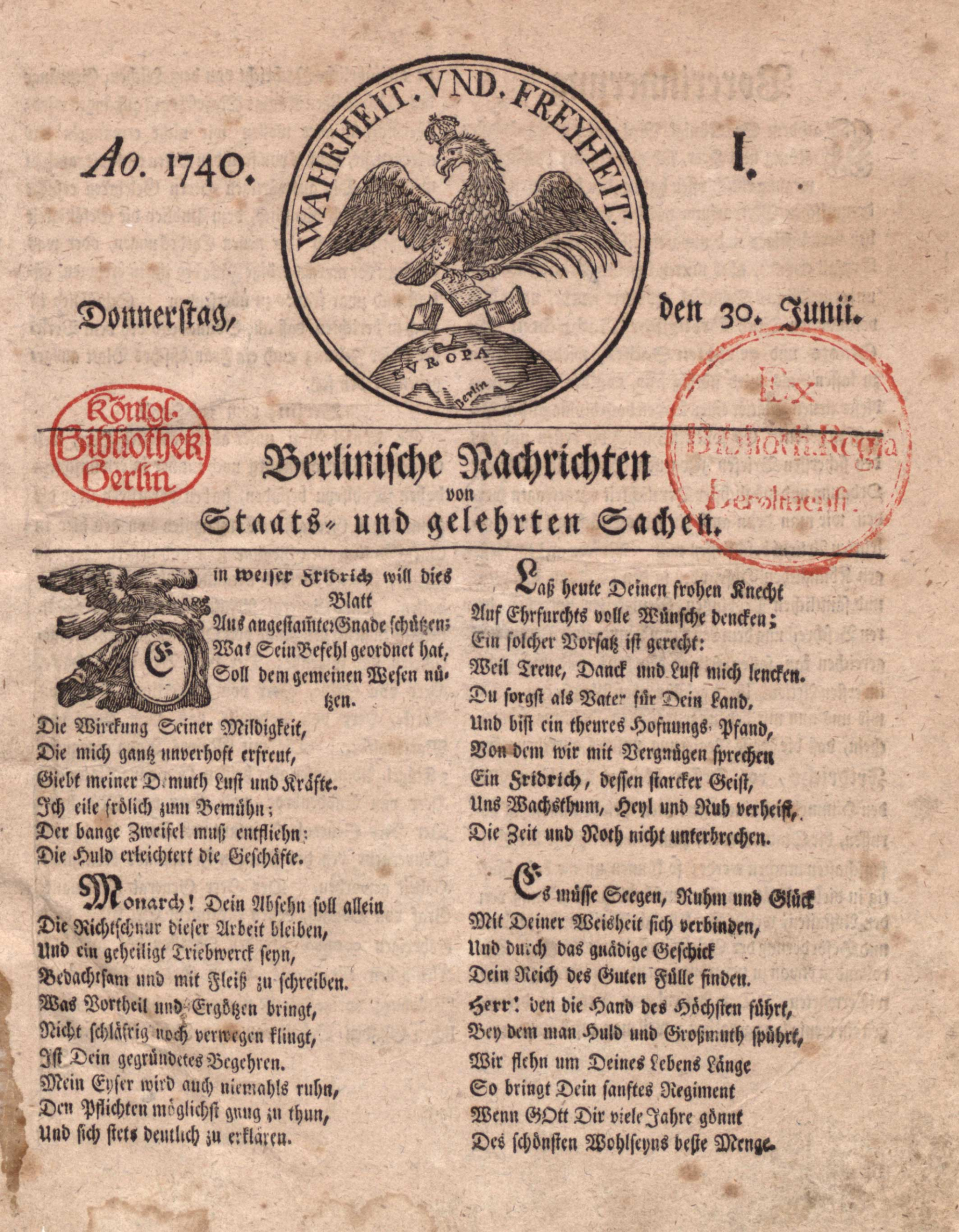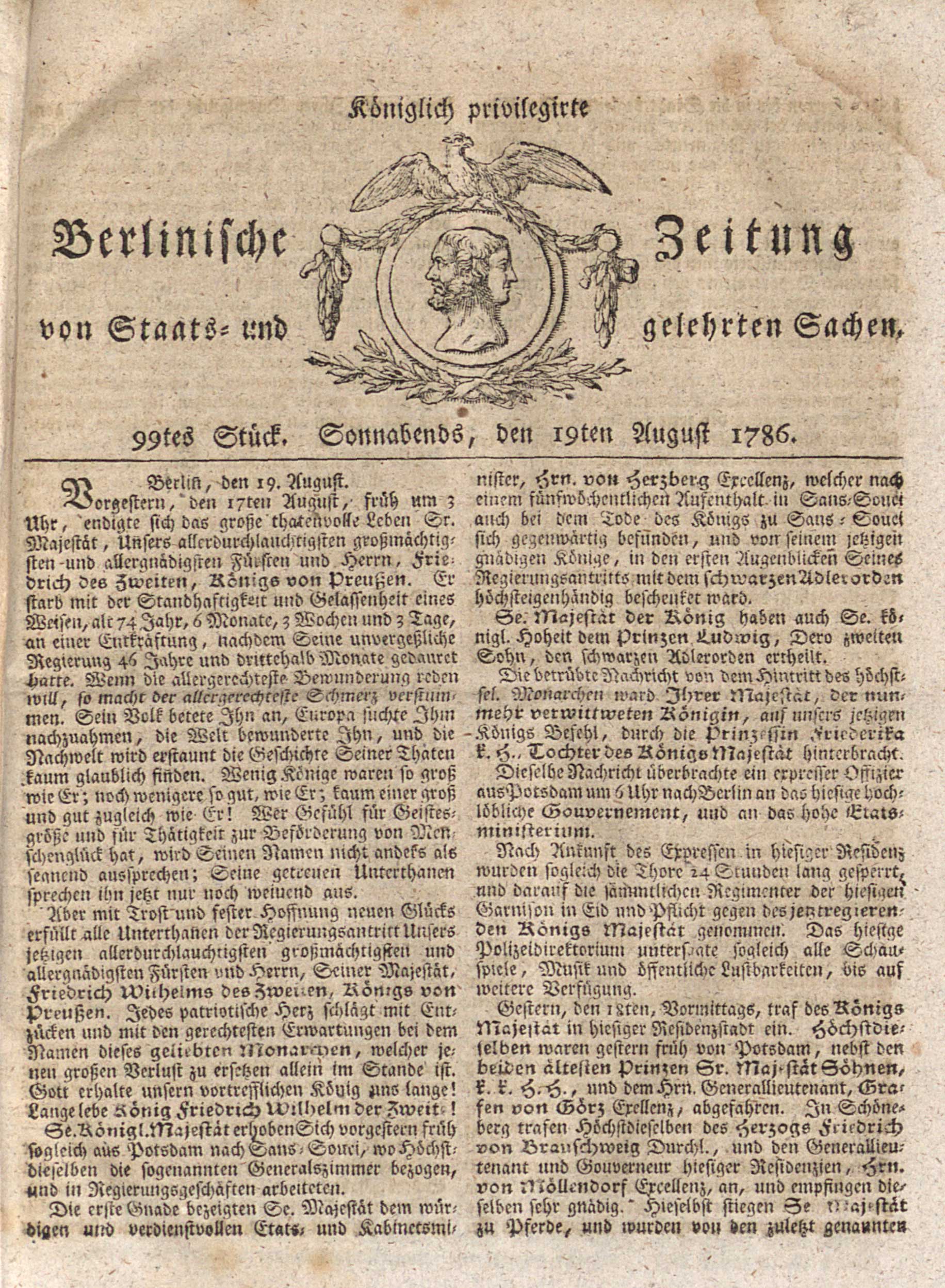4
The first newspapers and censorships
Friedrich II and the press
Berlinische Nachrichten von Staats- und gelehrten Sachen, Berlin, 30 June 1740, no. 1, title page. SBB-PK. Public Domain Mark 1.0
The newspaper Berlinische Nachrichten von Staats- und gelehrten Sachen (Berlin News on state and academic matters) was founded by the bookseller and publisher Johann Ambrosius Haude in 1740 in opposition to the already established Vossische Zeitung. After Haude’s death in 1748, ownership was transferred to his associate Johann Karl Spener and later to his son Johann Karl Philipp Spener, which is why it also went by the name of Haude- und Spenersche Zeitung. In 1874, the Spenersche Zeitung merged with the Berliner Nationalzeitung.
After the brothers Christoph (1575–1618) and Veit Frischmann (died 1662) published the first newspaper in Berlin in 1617, newspapers grew in importance and were well established by the 18th century. In 1721 the publisher Johann Andreas Rüdiger was granted the right by King Friedrich Wilhelm I to print a newspaper. At first it was called Berlinische Privilegirte Zeitung, which was later changed to Vossische Zeitung after Rüdiger’s son-in-law and successor Christian Friedrich Voß (1724–1795). However, during the reign of the ‘Soldier King’ the newspaper merely reported on trivial matters since the monarch forbade any critical opinions or stories concerning the royal family or his personal activities.
The king’s son, Crown Prince Friedrich, was in close contact with the bookseller Johann Ambrosius Haude (1690–1748). Haude acquired books for the crown prince, which his father had forbidden him to read, secretly storing the books belonging to the private library of the crown prince in his bookstore. After Friedrich II ascended the throne in 1740, he instructed Haude to publish two new newspapers, one in German and the other in French. Due to low demand, the French newspaper was discontinued after merely one year, whereas Berlinische Nachrichten von Staats- und gelehrten Sachen soon became one of the most well-known newspapers in the city.
Initially Friedrich II declared that there would be no censorship of the press. Upon which the publisher Haude, paid homage to the king in a poem, which was published in the first issue of the Berlinische Nachrichten. It reads as follows:
“To strive I joyfully hasten;
Fears or doubts must flee:
Grace eases business.”
Königlich privilegirte Berlinische Zeitung von Staats- und gelehrten Sachen, Berlin, 19 August 1786, 99th issue, title page. SBB-PK. Public Domain Mark 1.0
After several articles were published which criticised The Silesian Wars, censorship was reinstated in 1743.
Sometimes Friedrich II would directly interfere with the news report. Once when he considered the current news not interesting enough he wrote a fake report, published on 5 March 1767, in Berlinische Nachrichten von Staats- und Gelehrten Sachen as well as in Berlinische Privilegirte Zeitung on an alleged storm on 27 February 1767 in Potsdam when “roofs were destroyed by hail”, windows smashed in, and “hail the size of pumpkins fell on the streets”.
Two days after the death of Friedrich II on 17 August 1786, an obituary was published in Königlich privilegirte Berlinische Zeitung von Staats- und Gelehrten Sachen, expressing loyalty and devotion to the king: “A role model for all of Europe, adored by the people, and admired all around the world, the tales of his achievements will fascinate the world to come.”



